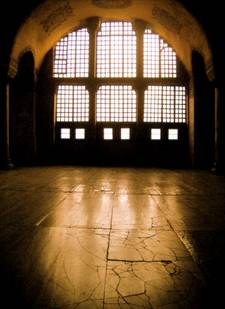Being Open.
Agya Sofia | Upper chambered north hall | Istanbul | 2005
Being open to others.
As usual, I wonder to the hidden meaning of a word like this.
Open.
What is the history of it, wherefrom comes the word? And, in most interesting words, there’s a history. Perhaps, in the range of timing, it’s thousands of years old.
—-
See here, then:
“O.E. open “not closed down, raised up” (of doors, gates, etc.), also “uncovered, bare; plain, evident,” from P.Gmc. *upana (cf. O.N. opinn, Swed. ppen, Dan. aaben, O.Fris. epen, O.H.G. offan “open”), from PIE *upo “up from under, over” (cf. L. sub, Gk. hypo).
Related to up, and throughout Gmc. the word has the appearance of a pp. of *up (v.), but no such verb has been found.
The source of words for “open” in many I.E. languages seems to be an opposite of the word for “closed, shut” (e.g. Goth. uslukan).
Of shops, etc., “available for business,” it dates from 1824. Transf. sense of “candid” is attested from 1513. The verb was O.E. openian, but etymology suggests the adj. was older.
Open up “cease to be secretive” is from 1921. The noun meaning “public knowledge” (esp. in out in the open) is attested from 1942; the sense of “an open competition” is from 1926, originally in a golf context.
Open-handed “liberal, generous” is from 1601.
Open door in ref. to international trading policies is attested from 1856.
Open season is first recorded 1896, of game; and figuratively 1914 of persons.
Open book in the fig. sense of “person easy to understand” is from 1853.
Open house “hospitality for all visitors” is first recorded 1824. Open-and-shut “simple, straightforward” first recorded 1841 in New Orleans.
Open marriage, one in which the partners sleep with whomever they please, is from 1972.
Open-minded (1828) is first recorded in Carlyle.
Open road (1817, Amer.Eng.) originally meant a public one; romanticized sense of “traveling as an expression of personal freedom” first recorded 1856, in Whitman.
—-
What’s the point, you might ask, to all that?
And most do: “why is he in to all that?” For me, it’s about digging into the roots of the word, the work, to learn more of the context. And what new meaning might be culled from the old. Why assume that you know?
Here’s the interesting point, in time, for me:
from PIE *upo “up from under, over”.
PIE is Proto Indo European — and it means the root languages in eastern Europe, north of Persia, east of India. There’s a theory that these aligned, formed a linguistic basin, or vessel, that bore these later outcomes. Sanskrit, Persian, eastern European — there are patterning alignments. A common source.
So to be open is to come from someplace, come from under, to “re-discovered”, to be, in learning: over something.
I’ve come from some place, underneath, out, now over something, to be open…And still working at it, the close of this year.
I love that idea.
Sorry for the lengthy exploration. But if you’ve gotten this far, then you are already there.
Open.
Wishing well, in any openings, to the light —
happy Christmas eve —
tsg | decatur island